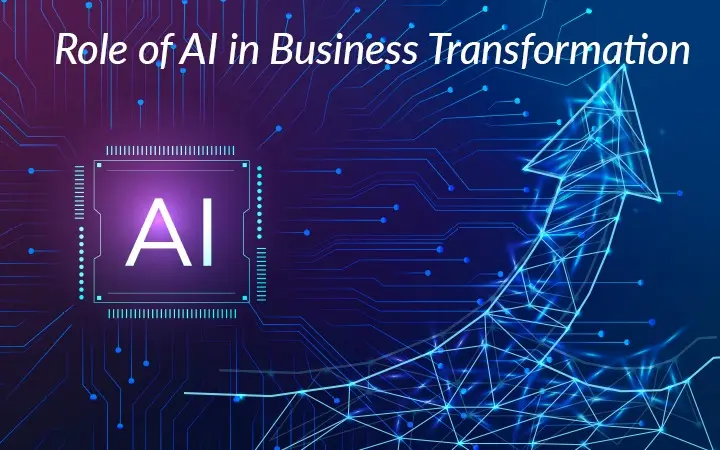Role of Artificial Intelligence in Business Transformation
June 23, 2023
YOU MAY ALSO LIKE
Related Posts

Artificial Intelligence (AI) is a cutting-edge technology that has the potential to revolutionize the future of digital transformation. It encompasses various subfields, such as machine learning, natural language processing, and computer vision, which enable machines to perform tasks that typically require human intelligence. AI systems can analyze vast amounts of data, identify patterns, make predictions, and continuously improve their performance over time. AI and business strategy are seamlessly intertwined as this transformative technology has the capability to enhance business processes, optimize decision-making, and unlock new opportunities for growth.
The rise of Artificial Intelligence in business has had a profound impact on various aspects of society. From self-driving cars to intelligent virtual assistants, AI technologies are transforming the way we live and interact with the world. In the business realm, AI driven digital transformation is reshaping industries and disrupting traditional processes. It enables organizations to automate repetitive tasks, improve accuracy and efficiency, and gain valuable insights from data. The widespread adoption of AI is fueling innovation, creating new business models, and driving economic growth.
Artificial Intelligence is revolutionizing the way businesses operate and compete in the digital era. It offers numerous benefits and impact of Artificial Intelligence on business operations cannot be overlooked…

AI-driven digital transformation empowers organizations to extract valuable insights from large datasets through AI-powered analytics, enabling them to make data-driven decisions and gain a competitive edge.
AI technologies automate repetitive and mundane tasks, freeing up human resources to focus on more complex and strategic activities leading to improved operational efficiency and cost savings.
AI enables organizations to analyze customer data and preferences, allowing them to deliver personalized experiences, tailored recommendations, and targeted marketing campaigns.
AI algorithms can analyze sensor data from equipment and machinery to predict maintenance needs and optimize maintenance schedules. This helps prevent unexpected breakdowns, reduce downtime, and increase operational efficiency.
AI-powered algorithms can detect patterns and anomalies in large datasets, enabling organizations to identify and prevent fraudulent activities.
AI-powered chatbots and virtual assistants provide automated customer support and enhance customer service by addressing queries and providing real-time assistance.
To effectively leverage AI and business strategy for transformative purposes, organizations need to consider the following strategies:
Organizations should create a clear vision and strategy for AI adoption, aligning it with business objectives. This involves identifying use cases, assessing data availability and quality, and defining implementation roadmaps.
Building a skilled AI team is crucial for successful implementation. Organizations should hire data scientists, AI experts, and domain specialists who can develop and deploy AI solutions effectively.
Organizations must prioritize ethical considerations, transparency, and fairness in AI development and deployment. It is important to establish guidelines and frameworks that address biases, privacy concerns, and accountability.
Collaboration between AI and business strategy teams is essential for successful implementation. Cross-functional teams should work together to identify opportunities, gather requirements, and ensure seamless integration of AI into existing processes.
AI technologies evolve rapidly, and organizations should foster a culture of continuous learning and adaptation. Regular evaluation, monitoring, and refinement of AI models and systems are necessary to stay ahead in the dynamic AI landscape.
The cloud plays a critical role in enabling AI driven digital transformation. It offers the necessary infrastructure, scalability, and computing power required to process and analyze large volumes of data. Key considerations include:

The cloud provides on-demand resources, allowing organizations to scale their AI infrastructure as needed. This flexibility is essential for handling varying workloads and accommodating future growth.
Cloud storage enables organizations to securely store and access large datasets required for training AI models. It also facilitates data sharing and collaboration across teams and departments.
Cloud providers offer AI services and platforms, providing pre-built AI models, APIs, and tools that organizations can leverage without significant investments in infrastructure or expertise.
Cloud providers implement robust security measures to protect data and AI models. Compliance with data protection regulations is crucial, and organizations should ensure their AI implementations adhere to the required standards.
The cloud enables seamless integration with other business systems and applications, facilitating data exchange and enabling organizations to create comprehensive AI solutions that leverage various data sources.
Offering immense potential to transform operations, enhance decision-making, and create personalized experiences for customers, Artificial Intelligence in business is a game-changer. By embracing AI, organizations can optimize processes, drive innovation, and gain a competitive edge in the digital age. However, successful AI implementation requires strategic planning, investment in talent, ethical considerations, and a continuous learning mindset. When combined with the power of the cloud, AI becomes even more accessible, scalable, and impactful, empowering organizations to embark on a transformative journey and unlock new opportunities for growth and success in the ever-evolving business landscape.
Ready to harness the power to realize the impact of Artificial Intelligence on business? Contact Motivity Labs today and discover how our expertise in AI solutions can drive innovation, enhance decision-making, and unlock new opportunities for your organization. Let’s shape the future together.